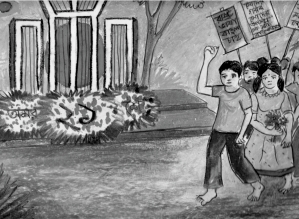
Saga of our independence
Mahbub Husain Khan
There are two significant dates in the history of our independence, Twenty-first February and twenty-sixth March. There are other memorable dates and occasions, as also days of tragedy when our leaders, including Bangabandhu and Shaheed Ziaur Rahman have been assassinated and when Bangalis have risen in protest against colonial domination and sacrificed their lives to demolish dictatorship. But these two dates still reign supreme.
 |
|
Artwork: Riana Rahman |
The first occasion which ignited the Bengali ire and conscience was when Muhammad Ali Jinnah declared at Dhaka that ' Urdu and Urdu alone..” would be the state language of Pakistan . And on twenty -first February when it was declared by the Bangalis that Bangla should be the country's State Language, it was the beginning of the end of the Pakistan as a nation of which East Pakistan was a part. Personally I have taken part in all of the twenty-first February memorial ceremonies from 1953 (with my father and till his death on 7th July, 1957), excepting the years 1968 when I was away from Bangladesh. In 1952, on 21st February my father was at the Dhaka University campus. My mother and myself stayed at home, though we were supposed to attend the wedding of a cousin of my father's on that day.This marriage did not survive and the divorced groom died a few years after 1952 .
Every year since 1953, on Ekushey February, we have seen posters, flyers, booklets and books dedicated to Ekushey February which always leads onto 26th March 1971 and then 16th December 1971. In February of 1995, Syed Shamsul Haque published his novel in verse from Antargata' which recounts the drama of 1971, as played out in a village in Rangpur (Syed Shamsul Haque's birthplace), and the aftermath of the Liberation War. Freedom fighters, collaborators, moralists, opportunists, the village and the city (Rangpur) are interwoven in the author's very own irrepressible literary style in which the tale of genocide, the mourning of deaths, and the celebration f victory earned keeps us reading tilt the very last verse.
The litterateurs and journalists have always been in the forefront of the 'Ekushey' publications. The National Press Club has been publishing an Ekushey collection, These collections contain poems, essays , stories about Ekushey February and our liberation struggle, and about contemporary Bangladesh sixty years after 1952. Each poem or essay is in a Class by itself, and the authors form the 'honour roll' of personalities of Ekushey and the Voice of Liberation .The 'Ekushey Shonkolon' is an example of what literary and cultural innovation and intellectual effort can attain. The saga of our independence evolves from such collections.
THE new millennium opened with international recognition of our language martyrs sacrifice and our movement for linguistic, cultural and national identity. With the designation of Ekushey February as International Mother Language Day global recognition was given to our role in ~'indicating the importance of the mother tongue in the national context and in our private lives. The meaning of the term 'mother tongue is that all children learn their language on their mother's laps.
Almost the whole of the population of Bangladesh, almost the whole of the states of West Bengal, Tripura and some of the people of Assam and Meghalaya have Bangla as their mother tongue. Taking into account the Bengali diaspora spread all over the world, about 250 million people have Bangla as their mother tongue. This is quite a significant number considering the fact that the number of people who speak English, which can truly claim to be a universal language, is no more than 500 million.
To propagate the linguistic characteristics of Bangla, the Bangla Academy was inaugurated by the then Chief Minister Abu Husain Sarkar on December 3,1955.I was present on the occasion along with my parents, my father Muhammad Husain Khan (who died on 7th July 1957) and my mother Khodeja Khatun (who died on 3rd February, 1990) Since then, Bangla Academy has been the centre for ideological and political protest, and the evolution of the Bangla language and culture .
Though sanctioned, funded and nurtured by the Pakistan government from 1955 till the promulgation of Martial Law in 1958, Bangla Academy was like a neglected child who should have remained invisible for the rest period under the Pakistan government. Yet, much of the students political and cultural protest during the period 1958-71 were centred in and around Bangla Academy, and were philosophically encouraged and actually participated in by the management and employees of the Academy.
The very building, which was originally Burdwan House, that had seen the hatching of conspiracies against the language movement of 1948 and unleashed the bloodbath of February 21, 1952, is now the symbol of Bangalee poets, Bangalee culture and Bangalee literary tradition and intellectualism.
Although a gathering of hook lovers and display of books took place at die Bangla Academy after liberation, the first formal Bol Mela started in 1981 with 14 stalls. This has now grown to over four hundred stalls every year. The Ekushey Boi Mela, a celebration of the Bengali way of life, is also a celebration of youth. Itis also away to inculcate the sprit of Bengali nationalism and pride in our traditions in the generations born after 1971.
Salam, Jabbar, Barkat and Rafique laid down their lives for cause ef Bengali language and culture They have become part of our life. And through establishing the International Mother Language Day on February 21, Bangladesh and its people have become a glorious part of the history of the world.
Mahbub Hussain Khan, a former government official, is a journalist and writer